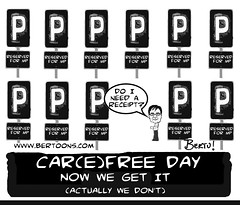At the start of this week I spoke of Joseph Muscat’s apparent cluelessness when it comes to dealing with the spin-offs of the Euro-economic crisis. Populist talk about “the EU needing to take decisive action” does not a government policy make. I have met people on this holiday who speak about the euro crisis as though it is happening to other people – or worse who seem to get some satisfaction out of the idea that the whole euro business might collapse. But this is Malta, whera new issue of BOV bonds or whatever they were is oversubscribed, where party policies are not questioned and where come what may health services and education will remain free.
Thank God for Nikita Alamango and her brilliant blog in the Times. With youth like this : ” a student, a member of the National Executive of PL, International Secretary of FZL and Deputy Secretary General of the National Youth Council” our nation can have a brighter future. Why am I so enamoured with this bright rising star of the labourite firmament? Because she’s done her research and has given whoever wishes to read her carefully edited blog due warning about the signs of the impending economic doom (Joseph, do take note). Prosit tal-programm to the Times for catching this gem and publishing such great material.
The blog post in question (Global markets – a ‘toxic cocktail) is being reproduced hereunder since the Times have a nasty habit of brushing embarrassing moments under the carpet (when they notice that is). What is really, really interesting for us gobsmacked enthusiasts of Labour’s enfant prodige is how her article uploaded on the Times on the 10th August (Saint Lawrence, not that the irony escapes us) seems to be uncannily similar to an article in the Financial Times by Gillian Tett (Eurozone crisis resembles US turmoil in 2008). Here’s a sample two paragraphs… the first is from Gillian’s in the FT and the second is from Nikita’s :
Gillian first…
When Greece first started to wobble, many policymakers – and some investors – tried to downplay it because Greece is so small relative to global markets – with less than €200bn of foreign-held central government debt. Similarly, Lehman Brothers and Bear Stearns, with assets of $600bn and $400bn, were also small compared with the US financial sector. (from this article in the FT)
And now Nikita…
When Greece started to quiver, many tried to downplay its importance arguing that Greece is relatively small compared to global markets. In the same way which Lehman Brothers were ‘small’ when compared with the US financial sector. (from the Times of Malta)
You think it is a coincidence? nah. The whole story on the FT is a series of bullets and all NIkita does is paraphrase the whole shebang, thesaurus in hand to replace words like “wobble” with “quiver”… here’s another example, if you are too lazy to compare the whole business (besides you might need to register (free) to read the FT article).
Again, here’s Gillian:This has now forced some eurozone leaders to move to a new phase and admit something they long denied: namely that Greek debt will need to be restructured and not everybody will always be bailed out. On one level this is sensible; reality is finally starting to bite. But on another, it takes the crisis to a new level – again, following the 2008 playbook. For what eurozone governments have done is push investors across a crucial psychological Rubicon – and make them realise that assets that used to seem risk-free now carry credit risk. As shocks go, this is perhaps comparable with the US government’s decision to put Fannie and Freddie into conservatorship in the summer of 2008. A sacrosanct assumption is being overturned; investors no longer know what to trust. (from this article in the FT)
And here’s the member of the Labour Party National Executive:
As a result, this has forced leaders within the Euro zone to move to a new era and admit what they have denied all along – that the Greek debt will have to be restructured and, unfortunately, not everybody will always be bailed out. This was a sensible acknowledgement;: reality is starting to bite. On the other hand, it pushes the crisis up to a new level reminding us of 2008. Governments across the Euro zone have pushed investors towards a crucial point, the realisation that all assets now carry a credit risk; (from the Times of Malta)
What do you say? Gillian Tett must be one hell of a lazy writer – plagiarising stuff from one of Malta’s up and coming politicians. Surely she should have known better. Hold on. Gillian’s article appeared on the FT on the 4th of August. That’s a good 6 days before Nikita’s Saint Lawrence day post. Lovely jubbly. It’s surely manpower like this that will help Joseph’s Labour create the new economic policy that will get us out of the current mess.
The Par Condicio Moment: A simple note to pre-empt labour diehards. J’accuse reseves equal treatment to ALL plagiarisers. Especially those who purport to be the leaders of our nation. If you doubt us just search “Scissorhands” in our search box … you will see how we are true to our word.
* Incidentally when copying and pasting parts of the FT article you get this message (Nikita must have surely had a hard time removing it):
Please respect FT.com’s ts&cs and copyright policy which allow you to: share links; copy content for personal use; & redistribute limited extracts. Email ftsales.support@ft.com to buy additional rights or use this link to reference the article – http://www.ft.com/cms/s/0/6691437a-beb3-11e0-a36b-00144feabdc0.html#ixzz1Uo76exV4
Nikita’s oeuvre in full…
Global markets – a ‘toxic’ cocktail
As the markets on Thursday and Friday reached a new low, I decided to browse some news websites to get the gist of the recent trends.
In particular, I think that the CNN piece titled Global markets destabilized by ‘toxic’ cocktail offers some food for thought.
The reporter goes on to explain how both investor and trader lacked confidence as share prices fell due to the ambiguity which dominated the global financial markets at the end of the week.
Thus, continues the CNN reporter, today’s global equity sell-off and the subsequent stock market drop was a result of a “toxic” cocktail of global economic factors and, of course, a lack of crisp and determined political leadership.
Many columnists and experts warned both investors and politicians against taking a long summer holiday this year. Sounds like an August plague, like the one back in 2007/2008, where senior leaders are away and the markets are thin and is, some how, bullying to unleash a new wave of unpredictability.
As temperatures in summer soar, the way in which today’s Euro zone story is taking shape feels unnervingly like the pattern behind the American financial disaster in the late 2008. Let’s ponder the following:
1. When Greece started to quiver, many tried to downplay its importance arguing that Greece is relatively small compared to global markets. In the same way which Lehman Brothers were ‘small’ when compared with the US financial sector;
2. Likewise, when the financial crisis broke out, policymakers in the Euro zone at first assumed that the problem was liquidity, not financial competence, and blamed it all on speculation and speculators. They repeatedly tried to postpone tough decisions that needed to be taken, just like the US authorities did in late 2007. However, it seems no more successful in the Euro zone than it was in the US;
3. As a result, this has forced leaders within the Euro zone to move to a new era and admit what they have denied all along – that the Greek debt will have to be restructured and, unfortunately, not everybody will always be bailed out. This was a sensible acknowledgement;: reality is starting to bite. On the other hand, it pushes the crisis up to a new level reminding us of 2008. Governments across the Euro zone have pushed investors towards a crucial point, the realisation that all assets now carry a credit risk;
4. Like the saying goes, every action has a reaction: a spreading sense of fear. With those investing in Euro zone bonds having low experience in calculating credit risk, they found it hard to assess which countries are safer than others. To make matters worse, very few have understood the complexity of interconnections between the Euro zone bands. It’s all about real-time data, apparently, and, of course, getting this picture of a country is quite a tough challenge since banks had stopped measuring their risks in the past decades;
5. Consequently, as fear grows, another ghost of the past returns: short-term funding risks. The structure of the Euro zone system has encouraged its financial institutions to rely heavily on short-term funding. Therefore, this results in an increasing risk of accelerating capital flight. This short-term funding could still dry up as it did twice in the case of Bear Stearns and Lehman Brothers in 2008 due to the unforeseeable actions of credit rating agencies which are sustaining market fears.
It’s interesting to note that while some analysts, as we have seen above, have compared this crisis to the 2008 recession, others like David Buick, are adamant that the current collapse cannot be compared with the 2008 crash. Buick also hints at the possibility of a new round of quantitative easing, whereby central banks print money to help boost economic growth.
On Monday, the ECB announced its intentions to purchase euro zone bonds in both Italy and Spain after both these countries declared new reforms and austerity measures with hope of boosting their economies respectively to demonstrate how serious they are to get on top of things.
Other than that – what’s next ?
After a temporary recovery illusion, we have to wait and see how this second phase of a double dip recession will develop. Will it truly follow 2008 into a full-scale financial meltdown? Will the state of the US economy improve soon to do dispel people’s fear that the US might go back into recession? And can the single currency, which is in dire straights, actually survive? (Obviously, the fragmentation of the Euro zone would make it much worse). Will major stock markets around the world (S&P500 and NASDAQ) continue to experience a downward trend while the Dollar (due to the news from Bank of Japan to “print” an extra 10 Trillion Yen) and gold continue to appreciate?
In all seriousness, I hope that a sultry summer will not result in an agitated autumn.
Let’s keep our fingers crossed.




